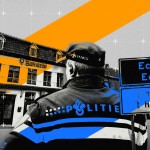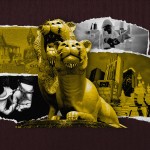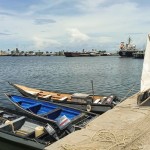Israeli Prime Minister Ehud Olmert faced an hour-long interview with his country’s fraud squad over alleged corruption on Friday, the fourth such corruption-related police inquiry he’s faced since taking office in 2006.
Investigators led by National Fraud Squad Lieutenant Chief Commander Shlomi Ayalon questioned the prime minister in Jerusalem on Friday. A court gag order has kept the police from discussing the case, but the local press reported Friday that the authorities were looking into new allegations that Olmert had received kickbacks before taking office. The case, reported one daily, involves large sums of cash from an American businessman who is also under investigation.
As is always the case when politicians are investigated for these types of alleged malfeasance, the opposition called for Olmert to temporarily step down until the investigation is finished. “Olmert is the most suspected PM in Israel’s history,” said Likud chairman Gideon Saar.
Saar is not far off the mark. The new investigation is the fifth that Olmert has been subject to since taking office – from potential conflicts of interest to fraudulent property transactions and abuse of power in connection with political appointments. Last November, the police said they didn’t have enough to go on to continue another investigation into Olmert’s alleged abuse of influence regarding the sale of the country’s second-largest bank. Olmert has not been charged following these recent investigations, and he has never been convicted of a crime.
Meanwhile, Olmert’s former bureau chief faced her second questioning in less than one week on Sunday. Shula Zaken is reportedly one of the main suspects in Olmert’s case and was put under house arrest last Tuesday. Zaken was suspended from her post as bureau chief one year ago, after police suspected her of involvement in the appointment of ‘yes-men’ at the Israeli Tax Authority, and of taking advantage of this to grant her friends tax benefits.
Olympics will attract much more than athletes, says Glenny
This summer’s Olympic Games in Beijing will not only bring athletes, sports fans and journalists to the Chinese capital – they will also bring hordes of prostitutes, reports the Toronto Star.
China has already ordered a “social cleansing” to clear Beijing of beggars, hawkers and prostitutes, but keeping crime groups from flooding the host city with hookers poses an Olympian task.
Author Misha Glenny (most recently the writer of global crime opus McMafia), speaking as the only source in the Star article, notes that he can’t look at a major international event like the Olympics without thinking of the various opportunities it presents to the international crime groups he’s written about.
Other recent Olympics, from Sydney in 2000 and Athens in 2004, have also been major attractions for prostitutes. But other sporting events have not risen to the occasion: When Germany hosted the World Cup in 2006, activists feared that as many as 40,000 women would be trafficked into the country and forced to work as prostitutes during football’s biggest worldwide event; police later said, however, that they had recorded no increase in either legal or illegal prostitution during that time.
Turks on trial
Four suspects from Turkey’s shadowy so-called “Association of the Union of Patriotic Forces” (VKGB in Turkish) went on trial for organized crime and fraud Monday in the south-eastern Anatolian town of Diyarbakir, reports Istanbul-based English-language daily Today’s Zaman.
The indictment against the four says that the suspects pressured and bribed certain individuals to have criminals released from prisons, to impose minimum sentences on certain convicted criminals and to hire VKGB associates for certain jobs.
The VKGB is described in press accounts as an ultra-nationalist crime gang with ties to the military. The same Turkish website reported last year that the Ankara prosecutor’s office had labeled the VKGB a terrorist organization – because of evidence that the group had run military and training camps on Turkey’s Black Sea coast.
Ordinarily an isolated news item like this wouldn’t be on the radar, but it comes after the recent arrests of a group of generals, academics and journalists linked to a string of murders, including the January 2007 murder of the ethnic Armenian editor Hrant Dink. More than 30 people have been arrested to date in what the New York Times called “one of the biggest operations against Turkish ultra-nationalists in decades.” The events also come at the same time that there’s a massive push-pull between what the Times and other press call the country’s “secular elite” and the more religious and observant new guard of politicians, led by Turkey’s prime minister.
US Justice Dept launches new intelligence office
The Justice Department’s National Security Division has launched a new Office of Intelligence, the department announced in an acronym-heavy press release last week.
The new office will deal with operations (to make sure that the FBI and other intelligence agencies can do intelligence operations according to the law), oversight (Justice Department attorneys are now authorized to examine the FBI’s national security program to make sure it follows the law) and litigation (to prepare requests for the Attorney General to authorize the use of Foreign Intelligence Surveillance Act information in criminal and civil courts).
Kim relative to head North Korea’s new anti-corruption campaign
In a new twist on nepotism, North Korean leader Kim Jong Il appointed his brother-in-law to lead a new campaign against corruption, Bloomberg reported Friday.
That brother-in-law, Jang Song Taek, went to Beijing and a Chinese city on the border with North Korea in February to root out corruption in Korean companies doing business in China. Bloomberg describes Jang’s power within Korea:
Jang, who was dismissed from Kim Jong Il's power circle in 2004, was rehabilitated in December 2005 and appointed to be Director of Administration of the Workers' party last October, an official at Chosensoren, a North Korean organization in Japan which acts as a de facto embassy, said, requesting anonymity.
The leader's brother-in-law is also responsible for the State Security Department, the People's Security Ministry and the Central Prosecutor's Office, according to the Chosensoren official. In addition, Jang runs a campaign against what the government calls anti-socialist activities.
Jang's mission was to find and punish people who were diverting profits that were supposed to be repatriated to the North Korean capital, Pyongyang.
“Jang is familiar with how the business is done outside the country and knows all about money and corrupt ways of making money,” Lee Young Hwa, professor of developing economies at Osaka's Kansai University, said. “His assignment is like sending a thief to catch a thief.”
To date, Mr Jang has rolled a number of heads, including that of Daesong General Bureau (it handles Kim Jong Il’s personal finances) director, who was fired for embezzlement.
{moscomment}


